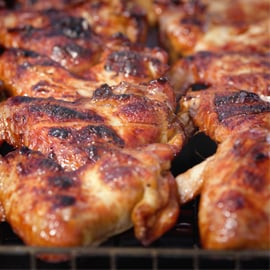
After weight loss surgery, protein is the most essential nutrient in your diet. Protein is responsible for building and maintaining muscle tissue and helping your body heal from injury. Becoming deficient of protein can lead to muscle loss, infection and other health consequences.
Dr. Taylor will provide you with detailed dietary instructions pertaining to your weight loss surgery procedure. Always follow the instructions provided to you by Dr. Taylor as closely as possible. This guide can provide generalizations of what is normal for most people, but Dr. Taylor can provide you with details more closely related to your individual circumstances.
Protein Requirements after Weight Loss Surgery
The exact amount of protein you should eat after weight loss surgery will depend on the type of bariatric procedure you’ve undergone, how long it has been since your surgical date and a number of other factors.
As a general rule, the suggested protein requirements for the leading forms of bariatric surgery are as follows:
- Gastric Band Surgery: The ideal daily protein consumption after gastric banding surgery is 1 gram per kilogram of your ideal body weight (1g / kg IBW).
- Roux-en-Y Gastric Bypass Surgery: The ideal daily protein consumption after gastric bypass is 1.2 grams per kilogram of your ideal body weight (1.2g / kg IBW).
- Gastric Sleeve Surgery: Following sleeve gastrectomy the ideal daily protein consumption is about 1.2 grams per kilogram of your ideal body weight (1.2 g / kg IBW).
These requirements do not begin directly following weight loss surgery, as you will undergo stages of a transitional diet as you readjust your body to eating solid foods. Within a month of weight loss surgery you should begin consuming protein levels similar to what is posted above. We can provide you with timing instructions as well as specific dietary instructions to follow.
Where to Find Protein
After weight loss surgery you will have to find lean sources of protein that pack the correct amount of grams without overloading you on calories.
Here Are a Few Good Sources of Lean Protein to Consider:
- Poultry
- Dairy products
- Fish
- Beans
- Lentils
- Eggs
- Soy
Before incorporating any of the above foods into your diet you should first discuss your dietary plans with Dr. Taylor.
Suggested Reading
Emotional Eating After Surgery
The Best Foods for Protein
Managing Special Occasions after Weight Loss Surgery
Also In This Section
- Quality over Quantity in the Post-Bariatric Surgery Diet
- Dining Choices after Weight Loss Surgery
- Fighting Food Cravings after Weight Loss Surgery
- At the Market after Weight Loss Surgery
- Be Happy with Your Healthy Diet after Bariatric Surgery
- Stress-Free Bariatric Dining
- Emotional Eating: Separate Feelings from Food
- Why Olympic Athletes Skip Sports Drinks
- Everybody’s Going Coconuts
- Think Smart at the Farmers Market
- Three Nutritious Whole Grain Alternatives
- Control Your Portions with 10 Simple Tricks
- Limit your Menu to Lose Weight
- Post-Bariatric Surgery Diet
- Avoid These Foods after Bariatric Surgery
- Long-Term Diet Guidelines for After Weight Loss Surgery

